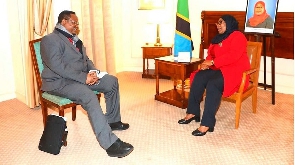 Chadema vice-chair Tundu Lissu (L) and President Samia Suluhu at a past meeting
Chadema vice-chair Tundu Lissu (L) and President Samia Suluhu at a past meeting
Top leaders of Tanzania's main opposition party Chadema have formally declared an end to reconciliation talks with the ruling Chama cha Mapinduzi, setting the stage for a no-holds-barred contest ahead of the local government elections in October next year.
In separate forums, Chadema chairman Freeman Mbowe and his deputy Tundu Lissu have asserted that they were no longer interested in mending fences with the President Samia Suluhu Hassan regime because of what they called a decline in sincerity and commitment in the “Maridhiano” talks.
They indicated that the party had already shifted its focus fully to polishing an ambitious nationwide strategy aimed at securing more grassroots votes in the civic polls and general election slated for 2025, even as CCM also bolstered its own team with new appointments to key positions in a bid to counter the threat.
Chadema's U-turn on the reconciliation talks came as little surprise to close observers of political developments in Tanzania after the government's decision last month to suspend a much-anticipated constitutional review for another three years until well after both elections.
Many had anticipated such a response in the light of the New Katiba postponement, which was announced by President Suluhu Hassan on September 11, along with slow progress in fulfilling promises to amend key election laws with just a year left before the civic polls.
The last Maridhiano session between CCM and Chadema was held in May this year. Since then, Chadema has become increasingly suspicious that President Samia's administration was merely stringing it along and using the reconciliation agenda as a smokescreen to maintain a firm grip on power.
The shelving of the constitutional review, which Chadema has been pursuing with vigour than Tanzania's other opposition parties, appears to have been the final straw. According to the government, the postponement is aimed at providing time and space to raise awareness among Tanzanians about what is in the current constitution before making changes.
First, Mr Mbowe, who had hitherto been the party's strongest supporter of the Maridhiano initiative, which President Samia launched back in April 2022, confirmed at a meeting with Chadema elders in Zanzibar on October 1 that he had all but given up on progress.
He said CCM had rejected all of Chadema's proposals related to the process of getting a new Katiba, establishing an independent electoral system, and doing away with laws that deny the opposition camp a level playing field come election time.
"We have been in these talks with our CCM colleagues for over a year, but now we see by their actions that they are not taking us seriously at all," the party chairman stated. "We haven't even met for the past five months, which leads us to believe that the negotiations have already died a natural death."
Mr. Lissu shed more light on Chadema's growing disillusionment in an October 21 telephone interview with a local television channel (Star TV) from his current location in the United States where he is "taking a break", to quote his own words.
Mr. Lissu asserted that it was CCM that "killed" the Maridhiano talks by rejecting Chadema's proposals "in writing".
"They have even refused the recommendations of the commission on democratic reforms that the president formed herself," he said. "In short they are not interested in any reconciliation whatsoever, therefore it is not true to say we broke off the talks but rather they did."
Unlike Mr. Mbowe, Mr. Lissu has maintained a lukewarm stance on the maridhiano talks from the outset, often appearing to be at loggerheads with the party chief over the rationale for continuing the talks.
He told the TV interviewer that the "collapse" of the talks was "ample proof that I was right all along."
Aside from the constitutional review postponement, Tanzania's parliament has yet to receive a Bill for election law amendments for consideration.
There were unverified reports that some laws may come up for review in the next parliamentary session in Dodoma in early November. The specific laws have not been disclosed.
Lissu said he was using his time in the US to complete a dissertation on Tanzania's elections set up under sponsorship from benefactors in Belgium where he spent more than five years recovering from serious injuries sustained in a 2017 assassination attempt.
"Generally the entire electoral system is in a worse state than most people think," he said in response to a question from the interviewer. Problematic areas he cited included election overseeing, voter registration and candidate approval procedures, campaign processes including securing police permits and protection, polling day procedures, vote counting and results announcements, and the handling of petitions related to disputed results.
"The flaws are too many to list here -- everything needs to be fixed," he said.